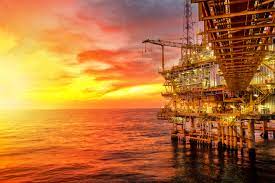By 2023, the country expects oil and gas exploitation to boost its Gross Domestic Product growth by 13.7 per cent.In 2019, Senegal’s hydrocarbon revenues reached $42.5 million, an increase of 37 per cent compared to 2018. According to a press release from the African Energy Chamber (AEC) seen by APA on Tuesday, “Senegal is on the verge of experiencing unprecedented growth based on (its) oil and gas resources.”
For this organisation, whose headquarters are in Johannesburg, South Africa, “this is a notable proof of the power” of hydrocarbons which can allow Senegal “to enter a new era of economic growth.”
Senegal, under the leadership of President Macky Sall, is in favour of “a fair energy transition.” This does not mean abandoning oil and gas activities and using only green energy sources such as wind, solar and hydrogen. Rather, it is about taking a responsible path to prevent climate change that is independent of the Western model.
African oil and gas producing countries are still under “increasing pressure” to break away from fossil fuels. For its part, “Senegal firmly supports an energy transition that honours the dual priority of socio-economic development and environmental preservation,” the source said.
Senegal’s Minister of Petroleum and Energy, Aïssatou Sophie Gladima said it was working on “a balanced and moderate approach to protecting the environment while considering the urgent needs of the Senegalese people and business community.”
According to the African Energy Chamber, “this is a step in the right direction” and rushing Senegal towards renewables would be “unfair” as the country is firmly committed “to reducing (its) carbon footprint.”
On this subject, Aïssatou Sophie Gladima was reassuring: “We are not ready to give up on the dream of a fair and inclusive energy transition, and we are demonstrating that we can achieve it.”
The African Chamber of Energy considers that Senegal, “as one of the youngest oil and gas producers in Africa,” has an “essential role to play in the progress of energy growth” on the black continent.
Indeed, it has two of the largest single projects currently underway, namely Australian Woodside Energy’s SNE (Sangomar) oil field and BP/Kosmos Energy’s Greater Tortue Ahmeyim LNG project. Straddling the border between Senegal and Mauritania, this field can supply up to ten million metric tonnes of liquefied natural gas per year. Commercialisation is planned for 2023.
In this perspective, the African Energy Chamber advises Senegal “to monetise its gas reserves” to create jobs and give opportunities to the young generation.
According to this structure, gas and oil projects “should attract large amounts of Foreign Direct Investment (FDI) to Senegal over the next decade.”
All this will promote “industrialization” and the construction of the infrastructure needed for the future. With President Macky Sall’s gas-to-power strategy, Senegal can serve consumers with “more accessible, cleaner and cheaper energy,” according to the African Energy Chamber.
Currently, electricity prices in Senegal are among the most expensive in West Africa. But in a few years, the Senegalese National Electricity Company (SENELEC) will switch from burning heavy fuel oil to more environmentally friendly and cost-effective natural gas.
Ultimately, cement, light industry, agribusiness, transport and many other sub-sectors will benefit greatly from a more accessible and readily available natural gas, the statement concluded.

